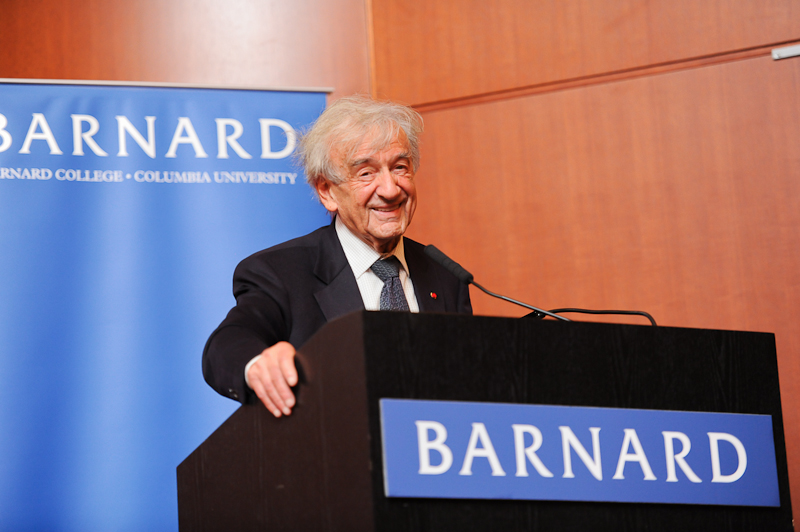Political Minutes: Elie Wiesel
Thursday evening in the Diana Center’s auditorium, Elie Wiesel, author of Night and over fifty other books, spoke about the Holocaust, anti-Semitism, indifference, and, briefly, his new novel, Hostage. Wiesel won the 1986 Nobel Peace Prize for being a “messenger to mankind” and has met every U.S. President since Jimmy Carter.
The famously introspective Wiesel began his speech on a humorous note – how to pronounce his last name. If you think that it’s pronounced “Vie-zil,” like I did, then you’re wrong – it’s “Veezel.” After this administrative detail, Wiesel started to talk about the topic he knows most intimately – the Holocaust.
Wiesel explained that “the Holocaust was a gradual process: it could have been stopped at any level.” First the Jews were humiliated and dehumanized; then they were segregated into ghettoes; then they were put on trains; and finally, they arrived at the concentration camps. Wiesel said that, when reflecting, he is always most deeply saddened by indifference because, ultimately, we are all humans. “We are all in connection: One life is not separate from another. God alone is alone.”
Wiesel railed against the evils of indifference eloquently during his speech. “I’ve fought indifference. Not only did I fight injustice, but I fought indifference. The opposite of love is not hate, but indifference. The opposite of knowledge is not ignorance but indifference. The opposite of culture is indifference. Indifference is therefore what you students must always be seen as a target to be abolished – indifference is never an option.”
After touching on indifference and hatred, Wiesel then explained how human dignity must above all always be respected. “When the bible says you shall love your fellow human being, it means don’t humiliate him…[Humiliation] means that you, who are humiliated, are less worthy than I; that you are better than I in the eyes of God; that you have rights that I have not … no, we are all equal.”
Wiesel closed his speech by reading to us what he called a credo of sorts. “I belong to a traumatized generation that often felt abandoned by God and betrayed by mankind and yet I believe one must not estrange oneself from either one or the other… Was it yesterday or eternities ago that some of us have realized that human beings are capable of unspeakable brutality? … I know and I speak with experience that even in the midst of darkness it is possible to create light and share warmth with one another; That even on the edge of the abyss it is possible to dream exultant dreams of compassion that it is possible to be free and strengthen the ideals of freedom even within imprisoned walls.”
Listening to Wiesel speak was like being hit with a tidal wave of profound compassion. I’ve yet to hear as eloquent a speaker. Few understand human suffering better than Wiesel, a Holocaust survivor who lost most of his family in the camps, yet still fewer seem to understand the human condition as well as he.
At times, even transcendent figures like Wiesel descend into politics. Following his 38 minute speech (Wiesel explained that the requested 40 minutes was too much for him), a brief Q&A moderated by Barnard President Debora Spar was held. Here, a bit of an agenda shone through. When asked if he thought something like the Holocaust could ever transpire again, Wiesel responded “There is a man in the world called Ahmadinejad.” Wiesel proceeded to explain how Ahmadinejad ought to be brought before the Hague and charged with crimes against humanity. Of course, I am in no position to criticize Wiesel – but this instance of politicking, complete with generalizations, seemed a little out of place in an otherwise beautiful and inspiring event.

